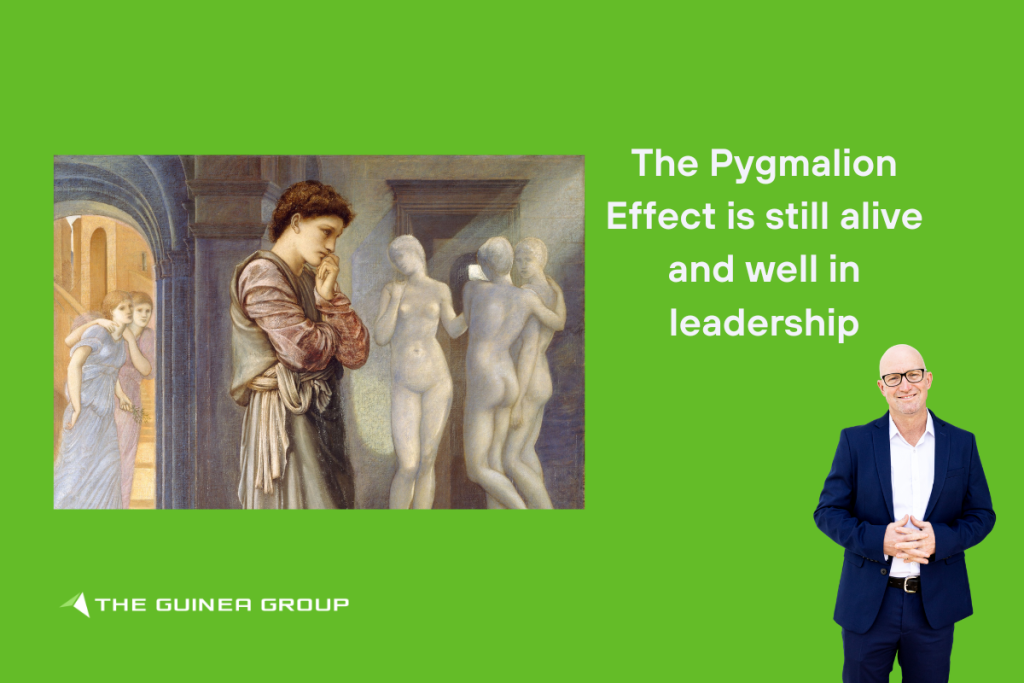Anton Guinea
Entrepreneur, Speaker, bestselling author, and founder of The Guinea Group of Companies. For over 15 years, Anton has helped leaders move their teams to become psychologically safe, physically safe and overall better versions of themselves.

The Pygmalion Effect is still alive and well in leadership

Once upon a time in Greek mythology, the king and sculptor Pygmalion carved a statue of a beautiful woman out of ivory. The statue was so beautiful that Pygmalion fell in love with it. He took a vow of chastity and devoted himself to the statue.
Pygmalion loved the statue as though it was a real person, he kissed it, and bought the statue gifts. Pygmalion could not admit his desire to anyone and kept it to himself.
One day, Pygmalion attended Aphrodite’s festival, where he made offerings at the altar of Aphrodite.
“There, too afraid to admit his desire, he quietly wished for a bride who would be “the living likeness of my ivory girl“. When he returned home, he kissed his ivory statue, and found that its lips felt warm. He kissed it again and found that the ivory had lost its hardness. Aphrodite had granted Pygmalion’s wish” (Credit: Wiki).
Over time, the happy couple had a daughter, who they named Paphos.
Fast forward to 2023, and the Pygmalion Effect is linked to how leaders view their team members. The idea behind the Pygmalion effect is that increasing the leader’s expectation of the follower’s performance will result in better follower performance.
The challenge for leaders is how to increase the expectation of follow performance in a way that is productive and supportive.
1. Leaders need to see potential
Potential precedes performance. So, it is not only about having an expectation of a high level of performance, but it is also about seeing what is possible for the team members. Seeing what they could be capable of, with the right leadership, coaching and mentoring. Then setting expectations.
We can all remember that leader that saw our potential, that gave us the opportunity to shine, and who knew what we were capable of. Even when we couldn’t see it ourselves. This is the Pygmalion Effect in action.
Seeing potential in others that they don’t see in themselves. Then, the expectation can follow. High expectations lead to improved performance and the opposite is the case.
2. Leaders need to hire potential
The old adage is true that we need to hire on attitude and train skill. Agreed. But at what point does potential come into the hiring conversation. At what point do leaders think about long term growth and development.
And do we hire for today, with the right cultural fit. Or do we have a longer term view and hire future leaders. Yes, attitude and cultural fit should trump skill, but I also feel that potential to become something great should be part of the hiring process.
Most of the time (especially in Australia in 2023, where resources are scarce, and it is an employee’s market), hiring is done ‘to fill a hole’. Then performance reviews and discussion might or might not get done.
Imagine hiring on potential, then supporting that potential, and expecting greatness from that team member. That would fundamentally change the hiring process.
3. Leaders need to be clear on expectations
Here is the challenge for a lot of leaders. And I have seen this in my coaching over about 700 one on one sessions in the last three years. Leaders think they are clear on what they expect. But they just aren’t. They are vague and they are unclear.
They don’t have an RACI matrix or similar, position descriptions are outdated (if they exist at all), and team members don’t know what is expected from them in their role. The Pygmalion Effect will create higher performance, if the high expectations are clear and concise, and achievable over time.
For leaders, an even better thing to do than to have high expectations, is to have high… and clear expectations. That are communicated and revisited.
I love the Pygmalion Effect, and there was some research done in the 1960s, where teachers were told that a random group of students were high achievers (even though they weren’t). And the teachers were told that another random group of students were low achievers (even though they weren’t). All students were randomly selected. The researchers found that the teachers treated each group of students differently, and the high achieving group became high achievers. And the low achieving group became low achievers.
How is this playing out in your workplace?
And please click the image below if you’d like to chat about what leadership means to you.
If you would like to learn more about Anton or The Guinea Group, please click here to book into Anton’s calendar, to:
UPGRADE your Mindset
UPSKILL your Leadership
UPLIFT your Teams
About Anton
Anton has dedicated his working life to helping leaders to upgrade their mindset, upskill their leadership, and uplift their teams! With a focus on helps leaders to better lead under pressure. Anton is an entrepreneur, speaker, consultant, bestselling author and founder of The Guinea Group. Over the past 19 years, Anton has worked with over 175+ global organisations, he has inspired workplace leadership, safety, and cultural change. He’s achieved this by combining his corporate expertise, education (Bachelor of HR and Psychology), and infectious energy levels.
Work With Anton!
Subscribe to our Newsletter
